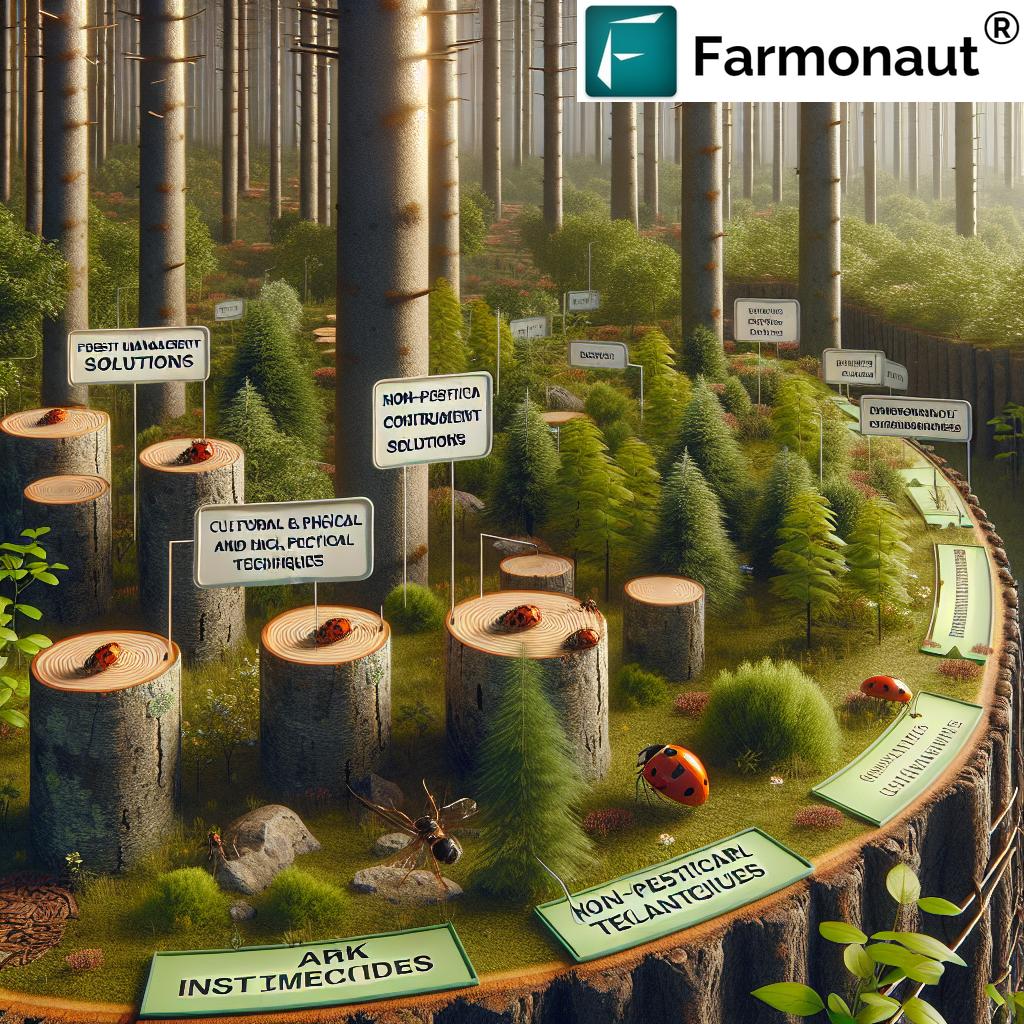Pest Control Bangalore: 7 Shocking Eco Hacks!
- Introduction
- Trivia: Eco Adoption
- Pest Control in Bangalore: Why Sustainability Matters
- Agricultural Pest Control in Bangalore
- Eco Hack 1: Integrated Pest Management (IPM) in Bangalore
- Eco Hack 2: Non-Pesticidal Management (NPM) Techniques
- Eco Hack 3: Herbal Pest Control Services for Crops and Forests
- Video Tutorials: Smart Pest Management with Farmonaut
- Eco-Hack Method Comparison Table
- Eco Hack 4: Biological Control Agents in Agriculture
- Eco Hack 5: Organic & Botanical Pest Solutions
- Eco Hack 6: Forestry Pest Management Solutions in Bangalore
- Trivia: Crop Losses Cut with IPM
- Eco Hack 7: Community Engagement & Regulatory Frameworks
- Farmonaut’s Satellite Innovation: Precision Pest Control
- Useful Tools & Resources for Sustainable Pest Management
- FAQs
- Conclusion: The Future of Pest Control Bangalore
“Over 60% of Bangalore farmers now use eco-friendly pest control, reducing chemical pesticide use significantly.”
Introduction
When it comes to pest control in Bangalore, sustainable strategies take center stage. The region is renowned for its rich biodiversity, tropical climate, and abundance of agriculture—including vegetables, fruits, and cereals. Yet, these factors also attract a wide array of pests that threaten our farming and forestry sectors.
As citizens of Bangalore, Karnataka, we’re facing a dual challenge: maximizing productivity and protecting the environment. Integrating eco-friendly pest management practices in both agriculture and forestry is not just an option—it’s the way forward for long-term sustainability and food security.
Pest Control in Bangalore: Why Sustainability Matters
Bangalore’s unique geography and climate make it both a hotspot for agricultural innovation and a prime target for pest infestations. From the verdant farmlands stretching across the city’s outskirts to the expansive forests like Bannerghatta National Park and Nandi Hills, pests such as aphids, caterpillars, termites, and invasive species regularly disrupt our ecosystems.
- Traditional, chemical-heavy methods have proven short-term effectiveness but pose risks to health, soil fertility, water systems, and local fauna.
- Modern, eco-focused pest control strategies address these risks—supporting both crop yields and environmental sustainability.
To meet Bangalore’s agricultural and forestry challenges, we need an integrated approach—one that blends the wisdom of tradition with the intelligence of science and the reach of technology.
Agricultural Pest Control in Bangalore
Bangalore’s agriculture—spanning vegetables (like tomatoes, chillies, and brinjal), fruits (such as mango, papaya, and guava), and staple cereals (including rice, ragi, and maize)—is the backbone of our local food system. Yet, pests like aphids, whiteflies, and caterpillars can devastate yields.
The University of Agricultural Sciences, Bangalore (UASB) and its partners advocate a science-based, eco-friendly approach to these challenges, promoting integrated pest management Bangalore (IPM) and non-pesticidal management techniques to ensure food security, economic sustainability, and health.
Eco Hack 1: Integrated Pest Management (IPM) in Bangalore
Integrated pest management Bangalore (IPM) is the “gold standard” for sustainable agricultural pest control in Karnataka. It’s more than a single method—it’s a smart strategy for combining several methods for optimal results.
-
What is IPM?
IPM blends biological, cultural, physical, and (when strictly necessary) chemical controls for pests. It’s about prevention, monitoring, and control—rather than blanket pesticide application. -
How does IPM work?
- Monitoring Pest Populations: Regular field scouting and use of traps (like yellow sticky traps for whiteflies).
- Resistant Varieties: Planting disease- and pest-resistant seeds to reduce vulnerability.
- Biological Control Agents in Agriculture: Releasing beneficial insects such as ladybugs, parasitoid wasps, and natural predators to target pests.
- Judicious Chemicals: Using targeted, low-toxicity pesticides only as a last resort—ensuring both crop yields and minimal environmental impact.
IPM is endorsed by the UASB (University of Agricultural Sciences, Bangalore), giving farmers a proven path to balance economic, health, and sustainability goals.
Eco Hack 2: Non-Pesticidal Management (NPM) Techniques
Non-pesticidal management techniques (NPM) are gaining traction in Bangalore’s farming communities as stricter regulations and consumer demand drive a shift away from toxic chemicals. Instead, farmers use natural pest control methods that protect the ecosystem and public health.
- Neem Oil Extracts: The most famous eco-friendly insecticide, extracted from the Azadirachta indica (neem) tree, disrupts hormone cycles in aphids, whiteflies, and caterpillars.
- Botanical Extracts: Pyrethrum (from chrysanthemum flowers), garlic-chilli sprays, and soap solutions deter pests without harming beneficial fauna or leaving toxic residues.
- Predator Support: Conserving habitats for birds, spiders, and frogs encourages a natural pest check in both crops and agroforestry plots.
NPM is cost-effective, protects the environment, and is recognized in the Indian agricultural policy for its potential to transform our pest management systems.
Eco Hack 3: Herbal Pest Control Services for Crops and Forests
With a rapidly growing population in Bangalore demanding chemical-free food and eco-friendly forestry solutions, local businesses and government-backed services now offer herbal pest control services that rival traditional techniques.
- Herbal Treatments: Use of plant-based oils (neem, citronella, eucalyptus), aromatic herbs, and flower extracts that repel pests but are harmless to humans and wildlife.
-
Eco Benefits:
- Zero toxic residues in crops and soils
- Enhanced biodiversity in farm and forest ecosystems
- Non-disruptive to pollinators and native fauna
- Available Services: Companies in Bangalore, like those listed on Get Pest Control, provide consulting, treatment, and long-term support for home gardens, farms, and forest edges.
Choosing herbal pest control isn’t just a trend, it’s a commitment to community, sustainability, and the planet.
Comparison Table of Eco-Friendly Pest Control Methods
| Pest Control Method | Estimated Effectiveness (%) | Environmental Impact | Cost Estimate (INR/acre) | Ideal Application (Crops/Forests) |
|---|---|---|---|---|
| Neem Oil Spray | 65–80% | Low | 400–800 | Vegetables, Fruits, Cereals |
| Biological Control Agents (Ladybugs, Wasps) | 55–75% | Low | 800–1500 | Crops, Forests (Aphids, Whiteflies) |
| Crop Rotation | 50–70% | Low | Varies (Minimal for most small farms) | Vegetables, Cereals |
| Herbal Pest Repellents | 50–60% | Low | 300–1000 | Home gardens, Organic farms |
| Mechanical Traps & Barriers | 40–60% | Low | 200–1200 | Crops, Forests |
| Cultural Techniques (Intercropping, Mulching) | 30–50% | Low | 100–500 | All (Crops/Forests) |
| Judicious Chemical Pesticides (IPM-Approved) | 70–85% | Moderate | 800–2500 | Severe outbreaks in Crops/Forests |
Eco Hack 4: Biological Control Agents in Agriculture
Deploying biological control agents in agriculture is one of the most powerful eco-hacks for pest control Bangalore has seen in the last decade. This approach uses living organisms to target and suppress pest populations with surgical precision.
-
Common Biological Agents:
- Ladybirds/Lady Beetles: Consume large quantities of aphids and whiteflies.
- Trichogramma Wasps: Parasitize caterpillar eggs in cereals and vegetables.
- Entomopathogenic Fungi & Bacteria: Attack soil insects, leaf-eaters, and pests in forest/tree nurseries.
-
Benefits:
- Targeted action—no harm to crops, people, or beneficial wildlife.
- Long-term pest population control.
- Promotes healthy, resilient agroecosystems.
Eco Hack 5: Organic & Botanical Pest Solutions
Organic pest control for crops in Karnataka is about more than just substituting synthetic pesticides. It’s a holistic system of cultural, biological, and physical practices:
- Crop Rotation & Intercropping: Prevent the buildup of soil-borne pests by alternating different crops and mixing companion plants.
- Mulching & Solarization: Suppress weed and insect habitats using natural cover materials and sunlight sterilization.
- Homemade Botanicals: Clove oil, garlic, chilli, and soap sprays disrupt insect feeding and reproduction while keeping soils healthy.
- Diversified Habitat Management: Creating buffer strips of native plants in and around fields to attract pest predators and pollinators.
Used together, these techniques offer robust organic pest control for crops, reduce environmental impact, and support local food security.
Eco Hack 6: Forestry Pest Management Solutions in Bangalore
In Bangalore’s expansive forests, including Bannerghatta National Park and Nandi Hills, unique challenges arise: invasive insects, termites, and bark beetles threaten biodiversity and the stability of native flora and fauna.
-
Institute of Wood Science and Technology (IWST):
Located in Bangalore, IWST leads research on pest and disease management in forests. Their conservation-based forestry pest management solutions include:- Studying pest biology and population cycles for targeted monitoring.
- Encouraging natural pest predators, reducing the need for chemical interventions.
- Developing eco-friendly control technologies for tree nurseries and plantation forests.
-
Sustainable Forestry Practices:
- Using mixed tree species to reduce risk of large-scale pest outbreaks.
- Applying herbal pest control services around ecotourism and buffer zones.
- Mechanical control methods like physical removal of infected branches.
Partnerships between researchers and the forest department help protect our green corridors. These practices support ecotourism, wildlife, and carbon capture in Karnataka’s national parks.
“Integrated pest management can cut pest-related crop losses in Bangalore by up to 40% sustainably.”
Eco Hack 7: Community Engagement & Regulatory Frameworks
Community engagement and regulatory control are the less-discussed, yet absolutely vital, pillars of sustainable pest management in Bangalore:
-
Education & Awareness:
- Workshops run by UASB and IWST build local knowledge on IPM, NPM, and new eco-friendly technologies.
- Training for farmers and forest managers strengthens adoption of practices like crop rotation, biological control, and careful pesticide use.
-
Policy & Regulation:
The Government of India maintains a strict registry of banned and restricted pesticides to safeguard health and the environment. This is enforced by state and national authorities, promoting adoption of safe alternatives.
Effective, sustainable pest control in Bangalore is a community movement—supported by regulation and driven by awareness!
Farmonaut’s Satellite Innovation: Precision Pest Control
As we strive for sustainable pest management, technology offers exceptional leverage. Farmonaut stands out with its advanced suite of tools accessible on Android, iOS, web, and via API.
-
Satellite-Based Crop Health Monitoring:
Farmonaut utilizes multispectral satellite imagery to assess crop health, soil moisture, and vegetation indices across villages, districts, or individual plots. This real-time visibility means we can spot pest outbreaks as they emerge, pinpoint hotspots, and take swift, targeted action. -
AI-based Jeevn Advisory System:
By analyzing weather, crop patterns, and pest activity, Jeevn AI recommends custom pest management strategies, making IPM and NPM even more precise and affordable. -
Blockchain-Based Traceability:
Traceability solutions by Farmonaut ensure every step—from sowing to harvest and pest control application—is securely recorded. This benefits those in food supply chains and increases consumer trust in organic, eco-managed crops. -
Fleet and Resource Management:
Large farms and forest operations can optimize logistics, pesticide application, and field labor with Fleet Management tools—saving cost and ensuring safety during pest emergencies or seasonal surges. -
Environmental Sustainability:
Farmonaut’s carbon footprinting platform quantifies emissions from farming and pest control practices, allowing users to lower their environmental impact and demonstrate sustainability efforts.
Download the Farmonaut app or explore the API for integrating these technologies into your workflow. Real-time data, AI, and advanced analytics are now in your hands!
Useful Tools & Resources for Sustainable Pest Management
- Large Scale Farm Management: For plantation operators and large farmers in Karnataka, Farmonaut’s Large Scale Farm Management App offers fleet, plantation, pest monitoring, and compliance tools for scalable operations.
- Forest, Crop, & Plantation Advisory: Tap into Farmonaut’s crop, plantation, and forest advisory service, which combines satellite intelligence and expert advisory for complete farm–forest–pest management.
- Crop Loan and Insurance: Need financing? Farmonaut’s Crop Loan and Insurance Verification tool provides satellite-based proof of crop area and condition, making loan processing smoother and insurance claims fairer—even when pest outbreaks strike!
Frequently Asked Questions: Pest Control Bangalore & Sustainable Pest Management
Q1: What are the most effective eco-friendly pest control methods for Bangalore’s crops?
We recommend integrated pest management Bangalore (IPM)—including neem oil sprays, biological control agents, and non-pesticidal management techniques—along with regular crop monitoring and community engagement. Together, these methods protect yields, reduce chemical pesticide dependence, and support the environment.
Q2: How can I reduce my reliance on chemical pesticides?
Start by adopting NPM (non-pesticidal management techniques), using resistant crop varieties, natural predators, and organic repellents. When chemical use is needed, choose low-toxicity products for targeted, as-needed application, always following regulatory guidelines.
Q3: Which pests are most problematic in Bangalore agriculture and forestry?
Common pests in Bangalore include aphids, whiteflies, caterpillars (agriculture); as well as termites, bark beetles, and invasive species (forestry). Each ecosystem requires tailored solutions for effective, sustainable control.
Q4: How does satellite technology help in sustainable pest control?
Tools like Farmonaut use satellite data to monitor crop health and spot potential pest outbreaks rapidly. This real-time, field-specific insight helps us apply precision pest management, minimizing unnecessary treatments and optimizing both yield and environmental health.
Q5: Where can I find the list of banned pesticides in India/Karnataka?
Refer to the official list of banned and restricted pesticides maintained by the Indian government for complete, up-to-date information.
Q6: Are there professional herbal pest control services available in Bangalore?
Yes, several licensed companies operate in Bangalore, offering herbal pest control services using plant-derived ingredients—providing safe, eco-friendly treatments for homes, farms, and wildlife buffer zones.
Farmonaut Subscription Plans & Pricing
Conclusion: The Future of Pest Control Bangalore—Our Path to Sustainability
Pest control Bangalore is evolving fast—shifting from chemical quick-fixes to holistic, data-driven, environmentally sound solutions. As a community, we are blending age-old wisdom with contemporary science and digital innovation. The result: higher crop and forest yields, lower costs, and a Bangalore that stands at the forefront of India’s sustainable agriculture and forestry revolution.
By embracing integrated pest management, non-pesticidal management, herbal services, community engagement, and breakthrough technologies like satellite monitoring, we secure a healthy, vibrant, and sustainable Bangalore for generations to come.
Are you ready to join the sustainable pest management movement? Download the Farmonaut app, explore their API, discover farm-specific solutions, or reach out for expert advice—and experience the new age of eco-smart pest control in Karnataka!
Together, let’s keep Bangalore green, productive, and healthy—one eco-hack at a time!












